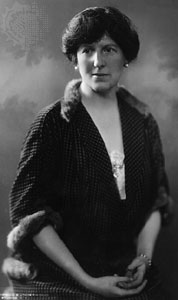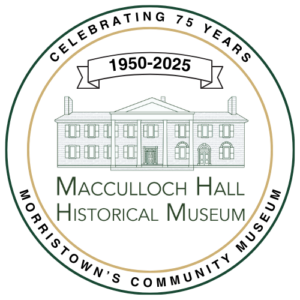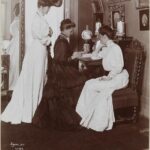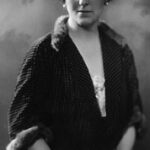Just before MHHM closed to the public in mid-March, the Museum opened “Living, Learning, Working, Serving: The Women of Macculloch Hall.” Exploring the accomplishments of the notable women from the Macculloch family, the exhibition also celebrates the centennial anniversary of the 19th Amendment, which gave women the right to vote.
Alice Duer Miller (1874-1942) is remembered as a poet, novelist, screenwriter, and activist in the battle to gain rights for women. She married Henry Wise Miller, George Macculloch’s great-grandson, in 1899. From 1914 to 1917, her weekly column, “Are Women People?” in the New York Tribune brought attention to arguments for and against women’s right to vote. She was a member of the Algonquin Round Table in the 1920s and 1930s. One of her most famous works, The White Cliffs, published in 1940, was adapted into the 1944 motion picture, The White Cliffs of Dover.
Both Alice Duer Miller (1874-1942) and her sister, Caroline King Duer (1865-1956), were proactive in following their passions. Alice Duer Miller graduated from Barnard College in 1899. After graduating, she served as a trustee and wrote the book, Barnard College: The First Fifty Years. Caroline King Duer volunteered in a hospital in France during World War I and returned to devastated France in 1917 to help after the war. Caroline would later become an editor at Vogue magazine.
Here is some timely advice from their book, Poems, published in 1896:
WASTED TIME.
Now, some people there be
Who would argue with me
On the pleasure of working for working’s sake,
Of the joys that you find
When you force your mind
New mountains to climb and new pathways to take.
Now they learn how to cook
From a cookery book;
They nurse the poor sick, or go visiting crime:
Seven fads in a day
Are not too much, for they
Would do anything rather than waste their time.
There are classes, indeed,
Fit for anyone’s need:
To play cards, the piano, or, sometimes, the deuce!
To make Browning seem plain.
To paint castles in Spain—
But if you’ve no talent, why, what is the use?
And a few collect things,
Such as butterflies’ wings,
And I collect words into versatile rhyme;
Yet I think, on the whole,
For the good of my soul,
I should rather do nothing than waste my time.
C. D.
What new hobbies you have started or pursued during COVID-19? Share with us on social media!
Resources:
Hear Alice Duer Miller and Caroline King Duer’s poems read aloud.
Read about the importance of hobbies from The New York Times.

Topic: History, Highlighting Women
Age / Level: High School, College



